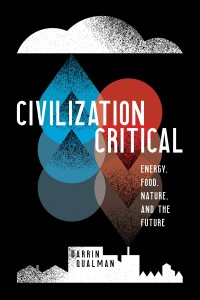Linear path perilous for climate, farmer argues

Civilization Critical
Energy, Food, Nature, and the Future
At any given moment, a federal or provincial environment minister can be heard touting a new vision for not only adapting to climate change, but mitigating its effects. At the same time, they preach economic growth and a tortoise-paced transition to a society not reliant on fossil fuels.
Herein lies the paradox — we are attempting to sustain growth while we are obliterating all the planetary boundaries necessary for supporting human life.
This paradoxical sentiment, drowned out ever more loudly by those who oppose even the most basic measure to account for externalities, such as a carbon tax, is simply not enough. According to outspoken Swedish teen climate activist Greta Thunberg, these ideas belong in a museum.
For Saskatchewan farmer Darrin Qualman, there needs to be a revolutionary movement which moves our current civilization back to one that understands circular models, is interconnected by webs and is fundamentally ecologically literate. In Civilization Critical: Energy, Food, Nature, and the Future, Qualman makes the argument that we are indeed “on the road to hell. But there are off-ramps — though we’re currently choosing to accelerate past them. We must make different choices.”
Qualman provides an anthropological, historical, economic and sociological look at how we have used energy to create this new civilization (dubbed eCivilization) that is based on ancient solar energy and which is fundamentally “structurally unstable.” Nature, on the other hand, is based on circular flows and loops, and our species has systematically eradicated the circular nature of the biosphere with in-out conveyor-belt systems. In the past few hundred years, we have powered the megaproject known as 21st-century civilization purely using linear systems. And as Qualman argues, “This dependence upon linear systems is without significant precedent in natural systems or in the human societies that proceeded eCivilization.”
Through an analysis of our evolution from circular to linear societies, to deep dives into photosynthesis and the differentiation between ancient and contemporary solar energy (our entire planet is virtually fuelled by the energy of the sun), to critiques of how we measure growth, Civilization Critical is a cry in the dark for all of us to think in systems and to envision planet Earth as the fundamental celestial body that supports all human life.
Our current progress, however, has been banked on the future. We have borrowed from our children: “Once parts of systems are linearized, pressure is brought to bear on circular flows in other parts of the system. Loop-breaking begets loop-breaking, all through eCivilization.” We simply cannot maintain our consumption rate of resources. The laws of thermodynamics simply do not abide.
And in our meat-frenzied, F-150-crazed and Mexican-vacation-travel-obsessed society, there doesn’t seem to be much hope. We are happy to jump aboard this runaway train, trumpeting recycling of straws on the one hand while extracting fossil fuels or ancient solar energy more each day than the last.
But this is not to suggest we are doomed, at least according to Qualman. Our species must react with the same force that has propelled us into this epoch. Civilization Critical outlines a pathway for human existence on this planet: “We must retool, refuel, replumb and rewire our global petrol-industrial consumerist civilization.” Not an easy task, given our addiction to stuff, the lack of vision and courage of political leaders and our seemingly inadequate ability to see the big picture.
Civilization Critical is mandatory reading for everyone who is determined to create a society that is more just, rooted in systems thinking and upholds hope for our children. To proceed along the current careless trajectory will render Qualman’s dystopian depiction of our future possible: “a lonely human reign upon an Earth emptied of wild animals and wild places and massively depleted and damaged by dissipative and pointless consumption.”
Let’s bank on hope.
— Winnipeg Free Press, June 2019

